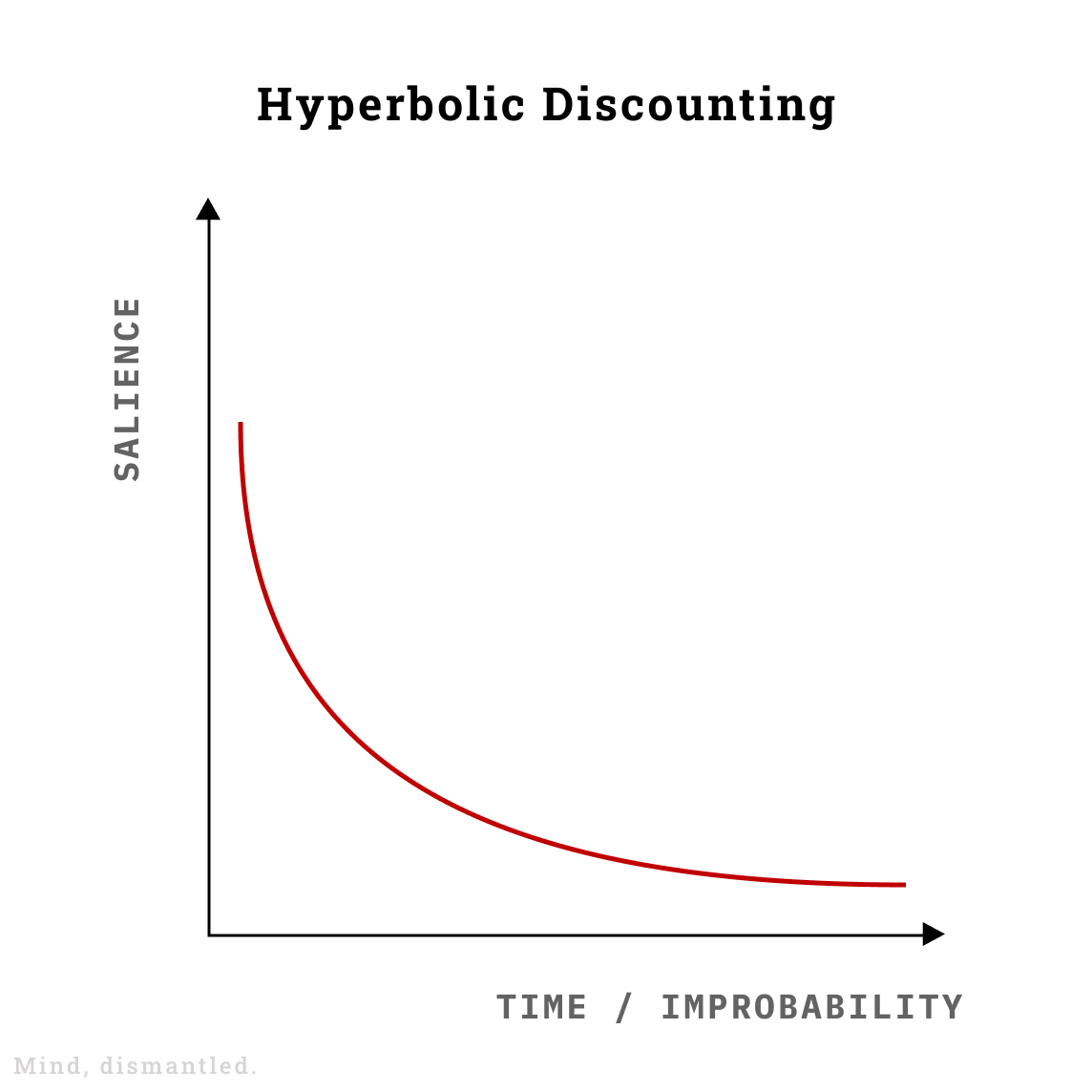Why is it so hard to build good habits, to follow through on our plans?
You know it’s not a “time” problem. I mean we have 100+ waking hours every week. No matter how “busy” you are, setting aside a few hours to exercise or learn or meditate or whatever should be easy. But it’s not. Because we fail to prioritize these things.
So it’s a “priority” problem. That’s why the question — what makes something a priority?
Something becomes a priority when we feel (not just think) that it’s more important than other things.
Now, here’s where things go wrong. What “feels” important to us (salience) is influenced by an adaptive mechanism called Hyperbolic Discounting. Hyperbolic Discounting is our tendency to discount the salience of rewards/events that are farther in future or low in probability.

A present stimulus has a large degree of salience. And something in the future has much less salience. That’s why we get caught up in the instant gratification trap. For instance, smoking a cigarette does not feel like a big deal in that moment because the possibility of lung cancer does not “feel” real — it gets heavily discounted.
But this mechanism actually serves a useful purpose. You should generally pay less attention to things that are less probable. If you don’t, all the possibilities will overwhelm you. That’s what happens with people who struggle with anxiety — they are not able to discount correctly and so they find low-probability events too salient.
Also, as is the case with adaptive mechanisms, hyperbolic discounting served an important evolutionary purpose — back in the day, it increased our chances of survival by helping us tune into immediate needs and threats. That’s why fear has a big impact on what we find salient. For instance, we all know how powerful deadlines and urgencies are when it comes to getting things done.
Maladaptive Discounting
But the most important things in life — family time, learning, building relationships, taking care of health, cultivating meaning — don’t have a deadline. And the rewards for dedicating time towards these things usually have a big lag.
And so the most important activities never feel urgent. We discount their value. We “think” they are important, we often talk about these things — but we don’t really “feel” the importance. If we did, our actions and priorities would reflect that.
Most people don’t realize the importance of these things until they’re on their deathbed or get a major health scare. Facing death, when those important things get a deadline, it suddenly hits them. Most dying/old folks have the same regret — that they wasted their life chasing false urgencies, playing status games and neglected what was actually important.
So what can we do about the discounting machinery to counter the potential long-term damages?
Countering the Discounting
Your mind has a salience landscape — a map that details the significance of everything in your life. It is heavily influenced by childhood conditioning, and of course, evolutionary conditioning.
But you can train your salience landscape to internalize the significance of certain things in life. The idea is to figure out what is important to you and then constantly reinforce it. Write about it. Put it on your phone’s lockscreen. Slap it on your wardrobe. The more you keep it at the top of your mind, the more it gets internalized.
I find that a well-curated twitter feed is a very useful and effective way to do this. People keep reiterating timeless wisdom in different ways and over time it just seeps into your subconscious.
Another thing to keep in mind — when you’re trying to build a habit, it’s vital to understand how that habit changes your mind and body and life. Because when you only have a vague sense of why a certain habit is important for you, it’s very easy for your mind to discount its importance.
Having multiple strong specific reasons for why you need to do something counters the hyperbolic discounting machinery. Speaking from personal experience, taking the time out to read and write about the benefits of meditation/exercise helped me drill down the importance of these things into my brain.
Relevant plugs:
And last, since we know that fear has a big impact on what we find salient, spend some time contemplating the consequences of neglecting the important stuff? You don’t have to wait until you’re on your deathbed.
I mean take brushing your teeth for example. You do it every day without fail because you worry about foul-smelling breath and cavities. If you similarly feared living a limited life, maybe you’ll automatically start prioritising the “important things” 🙂
Thank you for reading. Most of the content on this website has emerged from conversations with readers like you.
Every Sunday, I send out an email dissecting some aspect of the human mind.
If you can take out a few minutes every week, I’ll help you develop a strong understanding of how your mind works. So that you can have more control over your thoughts, behavior, and life.
You can sign-up below.
Or you can sign-up after reading my story and the core idea behind this website: We Should Be Getting More Out of Our Lives (would recommend)
Feedback and comments are very much appreciated.